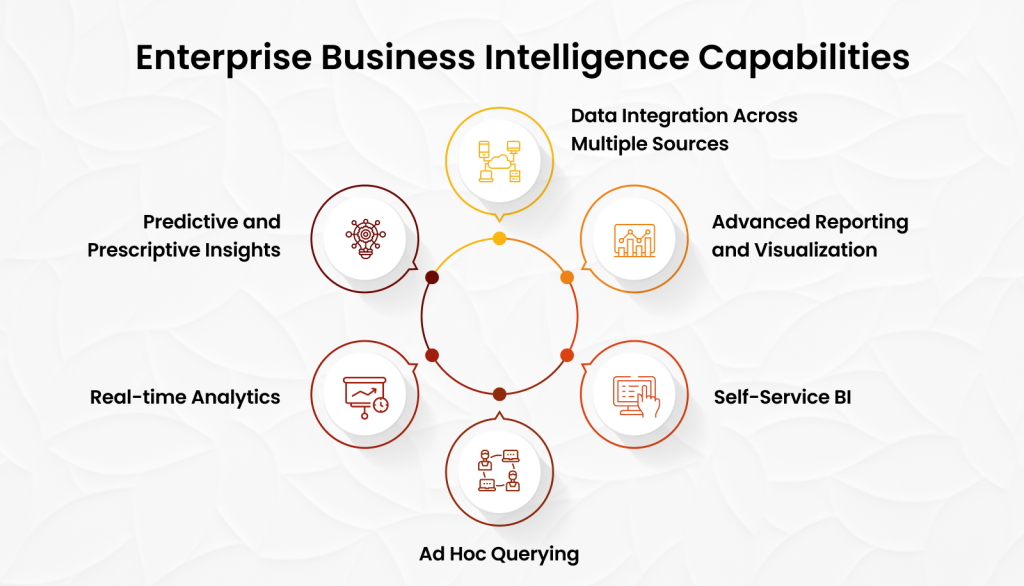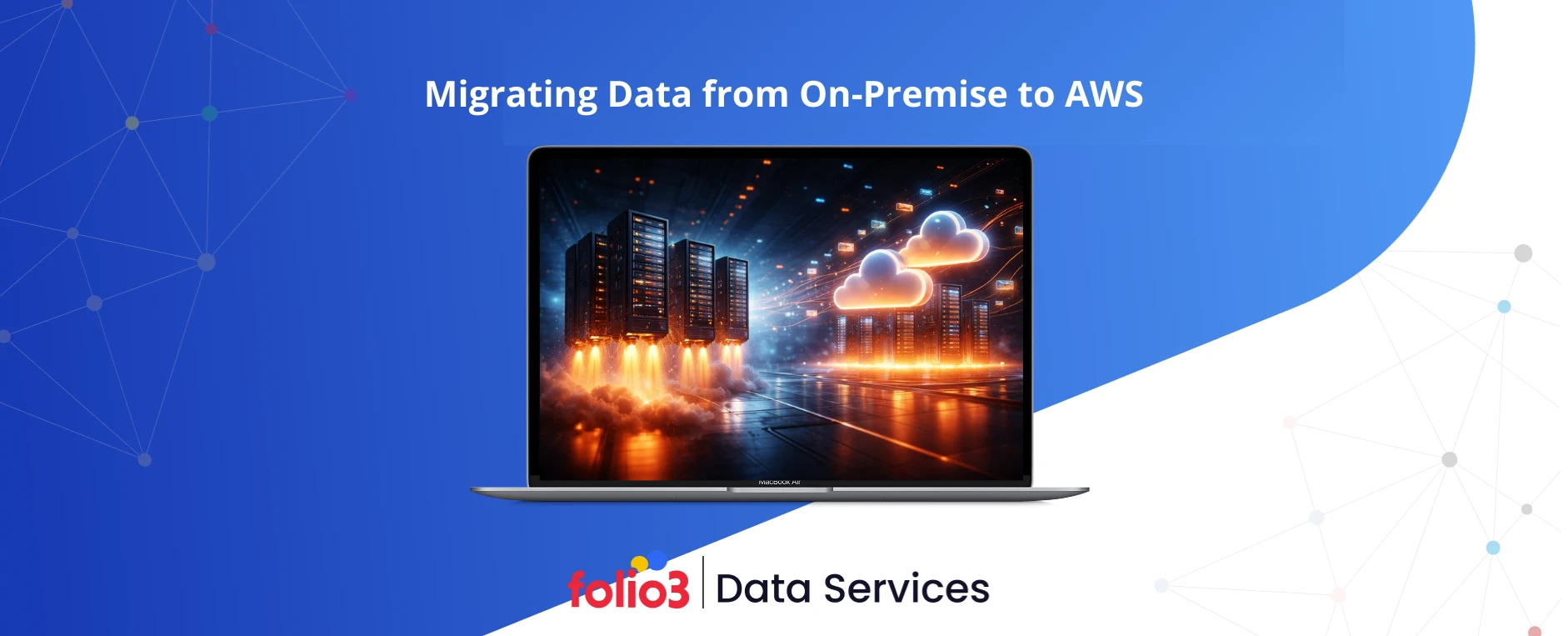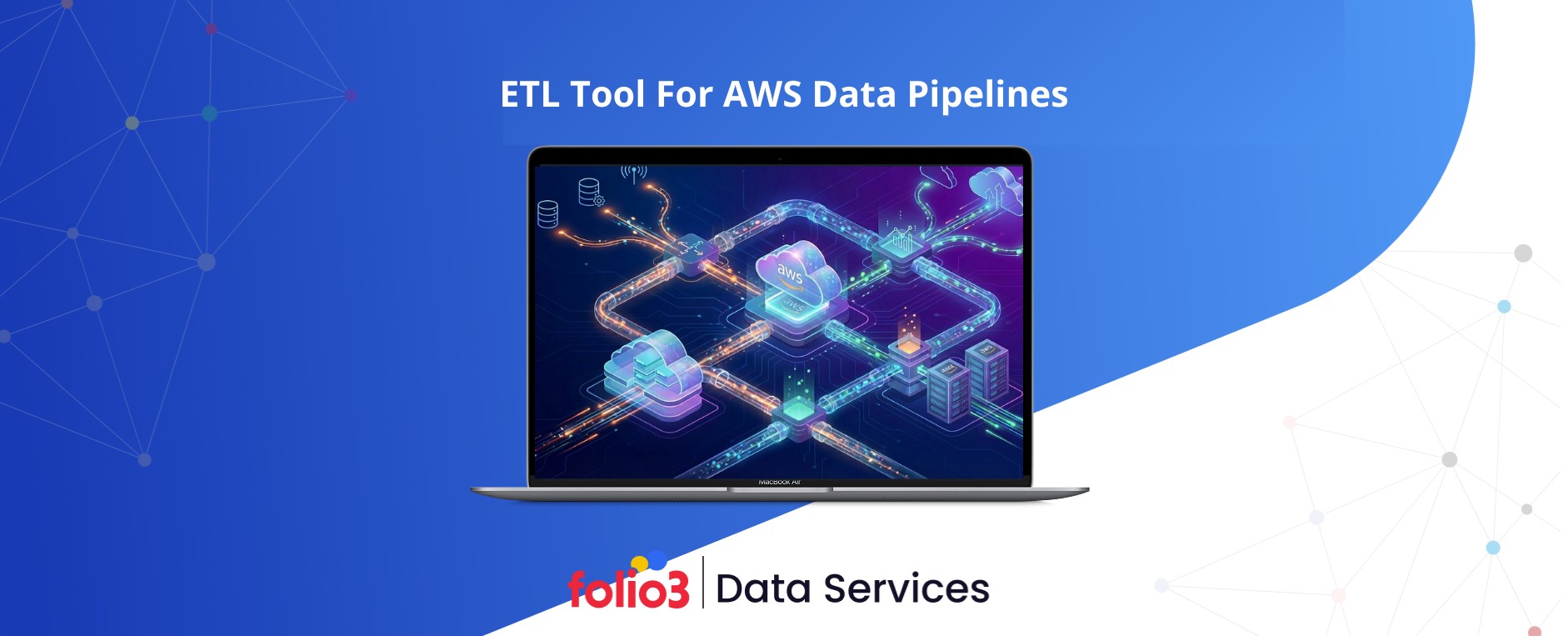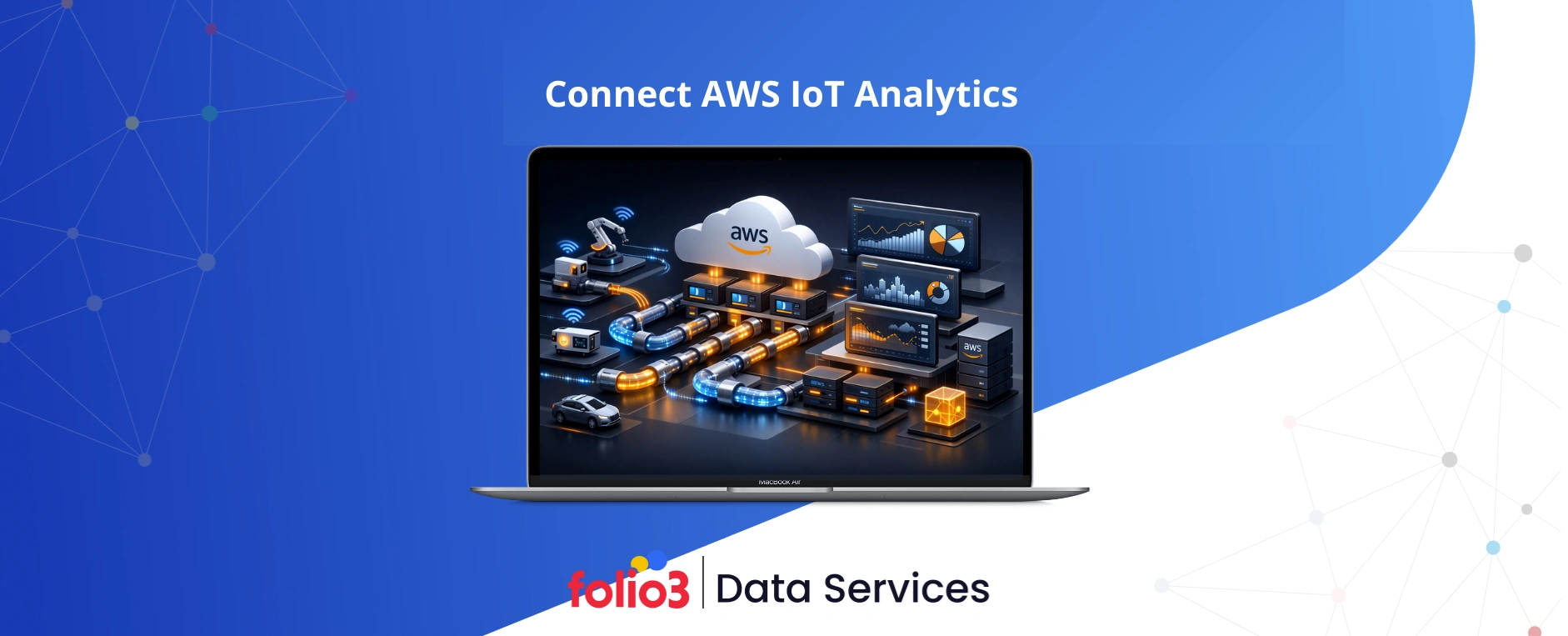In large organizations, using data effectively is crucial for informed decision-making. Studies show that highly data-driven companies are three times more likely to report significant improvements in decision-making compared to their less data-focused counterparts.
Enterprise Business Intelligence (EBI) plays a pivotal role in this process by providing comprehensive insights across all business areas. Unlike traditional Business Intelligence (BI), which often relies on centralized data warehouses and IT-driven reporting, EBI offers a more integrated and user-friendly approach.
Traditional BI systems can become bottlenecks when business users depend solely on IT teams for analytical queries and report generation. Organizations can empower their teams with real-time data access and analysis by implementing enterprise business intelligence software and solutions.
This approach enhances agility and fosters a data-driven culture, enabling more effective responses to market dynamics. Developing a robust enterprise business intelligence strategy and utilizing advanced business intelligence tools are essential to achieving these benefits.
So, keep reading this blog to learn more about enterprise business intelligence!
What is Enterprise Business Intelligence (EBI)?
Enterprise Business Intelligence (EBI) is a strategic approach that enables large organizations to collect, analyze, and utilize data effectively for smarter decision-making. Unlike traditional BI, which often focuses on departmental analytics, EBI integrates data from multiple sources across an enterprise, offering a comprehensive view of business performance.
This holistic approach helps executives and managers make data-driven decisions that drive efficiency, reduce risks, and boost profitability. With access to real-time insights, businesses can quickly adapt to market changes, optimize operations, and identify growth opportunities. Organizations use enterprise business intelligence software to streamline data processing, while an enterprise BI platform ensures seamless data integration from various departments.
These tools empower decision-makers with interactive dashboards, predictive analytics, and automated reporting. Companies that adopt enterprise business intelligence solutions report improved operational efficiency and faster response times to emerging challenges.
Incorporating enterprise business intelligence tools allows businesses to transform raw data into actionable insights, helping them make informed choices that align with their strategic goals. With the right EBI framework in place, companies can enhance internal efficiencies and create a more agile and data-driven culture.
Capabilities of Enterprise Business Intelligence
Enterprise Business Intelligence (EBI) is more than just a data management system—it’s a powerful framework that transforms raw data into strategic insights. Organizations can optimize operations and gain a competitive edge by using advanced data analytics services, visualization tools, and self-service capabilities.
By integrating these capabilities, enterprise BI software helps businesses transition from reactive decision-making to proactive and strategic planning. Organizations that implement a well-defined enterprise business intelligence strategy enhance efficiency and position themselves for long-term success in an increasingly data-driven world.
Here are some key capabilities that make EBI indispensable for large enterprises:

1. Data Integration Across Multiple Sources
One of the biggest challenges in large organizations is dealing with scattered data across various departments, systems, and applications. Enterprise business intelligence software integrates data from CRM systems, ERP solutions, cloud storage, IoT devices, and other sources, ensuring a centralized, real-time view of business performance.
2. Advanced Reporting and Visualization
Access to data is not enough; decision-makers need clear, easy-to-understand reports. Enterprise business intelligence platforms provide interactive dashboards, automated reports, and dynamic visualizations that simplify complex datasets. This is where data visualization services add immense value by presenting insights in an intuitive format.
3. Self-Service BI
Gone are the days when business users had to rely on IT teams for every data request. Enterprise business intelligence solutions now include self-service BI capabilities, empowering employees across different departments to access, analyze, and generate reports without technical expertise. This reduces bottlenecks, speeds decision-making, and fosters a data-driven organizational culture.
4. Ad Hoc Querying
Business leaders often need quick answers to pressing questions without waiting for predefined reports. With enterprise business intelligence tools, users can run ad hoc queries—custom searches that extract specific insights in real time. This flexibility allows managers to respond faster to market changes and operational challenges, improving agility and responsiveness.
5. Real-time Analytics
We are a part of a fast-paced business environment, and waiting for end-of-month reports is no longer viable. Enterprise business intelligence strategies emphasize real-time analytics, allowing organizations to track performance metrics, monitor KPIs, and detect anomalies as they happen. A survey conducted by IDC in partnership with InterSystems found that 54% of executives reported that a lack of timely access to data limits operational efficiency.
6. Predictive and Prescriptive Insights
Modern businesses require more than historical data—they need forecasts and actionable recommendations. Enterprise business intelligence platforms now incorporate predictive analytics services (forecasting future trends based on past data) and prescriptive analytics (suggesting the best course of action).
Uses of Enterprise Business Intelligence
Enterprise Business Intelligence (EBI) is crucial in helping businesses make informed decisions across various functions. Companies can use enterprise business intelligence software to improve strategic planning, operational efficiency, sales performance, financial management, and supply chain optimization.
By incorporating enterprise business intelligence solutions, businesses can make more intelligent, strategic decisions, ensuring long-term growth and adaptability in an ever-changing market. Here’s how EBI is applied in different areas:
1. Strategic Planning
A well-implemented enterprise business intelligence strategy helps organizations align their goals with real-time insights. Decision-makers can track key performance indicators (KPIs), assess market trends, and adjust strategies accordingly. With a centralized view of data, businesses can proactively address challenges and capitalize on new opportunities.
2. Operational Efficiency
Efficiency is at the core of business success. Enterprise business intelligence solutions provide real-time monitoring and reporting, helping organizations identify inefficiencies, streamline workflows, and reduce costs. Whether improving production processes or enhancing resource allocation, EBI ensures smoother operations.
3. Sales and Marketing Optimization
Understanding customer behavior is key to improving sales and marketing strategies. Enterprise business intelligence platforms analyze customer interactions, sales trends, and campaign effectiveness, allowing businesses to tailor their marketing efforts for better engagement and higher conversion rates. Companies often complement this with business intelligence services to further enhance targeted strategy and ROI.
4. Financial Management
Accurate financial insights are essential for budgeting, forecasting, and overall financial health. Enterprise business intelligence tools help finance teams track revenue, expenses, and cash flow while ensuring data-driven decision-making. Automated reporting also reduces manual workload and improves financial transparency.
5. Supply Chain and Inventory Management
Managing inventory and supply chains efficiently requires real-time insights. Enterprise business intelligence software enables organizations to monitor stock levels, track supplier performance, and optimize logistics. This ensures businesses can meet customer demands while minimizing waste and reducing costs.
Benefits of Enterprise Business Intelligence
Enterprise Business Intelligence (EBI) is more than just data collection—it’s about transforming raw information into meaningful insights that drive business success. With a well-implemented EBI strategy, organizations can optimize decision-making, streamline operations, and gain a competitive edge.
A well-implemented enterprise business intelligence strategy empowers businesses to operate more efficiently, make informed decisions, and maintain a strong competitive position in a rapidly evolving marketplace. Here’s how EBI benefits businesses:
1. Improved Decision-Making at All Levels
In large organizations, every department—from executives to frontline employees—needs timely, relevant data access. Enterprise business intelligence software centralizes information, providing users with interactive dashboards, reports, and real-time analytics. This enables faster, more accurate decision-making, reducing reliance on intuition or outdated reports. Companies that use EBI effectively can respond to market changes more swiftly and make proactive, data-driven choices.
2. Enhanced Operational Efficiency and Productivity
Manual data handling and inefficient reporting processes can slow down operations. Enterprise business intelligence, often supported by data engineering solutions, automate data collection, reporting, and analysis, freeing employees from repetitive tasks.
With real-time performance tracking, organizations can identify bottlenecks, optimize workflows, and improve productivity. By integrating data from multiple departments, businesses can ensure that teams work with the most up-to-date insights, improving overall efficiency.
3. Better Customer Insights and Market Trends Identification
Understanding customer preferences and market shifts is essential for staying competitive. Enterprise business intelligence platforms analyze customer data, including purchasing patterns, feedback, and engagement levels.
By incorporating AI-based data extraction, these platforms can process vast amounts of unstructured data—such as reviews, emails, and social media comments—to uncover deeper behavioral insights. This helps businesses identify trends, personalize marketing strategies, and enhance customer experiences. Whether launching a new product or adjusting pricing strategies, EBI provides the insights needed to make informed decisions.
4. Competitive Advantage Through Data-Driven Strategies
Businesses that rely on enterprise business intelligence tools can make smarter, more strategic moves than competitors still using traditional reporting methods. With more profound insights into industry trends, sales performance, and operational efficiencies, organizations can develop data-driven strategies that give them an edge in the market. Companies that use EBI effectively are more agile, innovative, and prepared to seize growth opportunities.
5. Support for Regulatory Compliance and Risk Management
Compliance with industry regulations and risk mitigation are critical for businesses, especially in highly regulated sectors. Enterprise business intelligence solutions help organizations monitor compliance requirements, track audit trails, and ensure accurate reporting. By identifying risks early, whether in financial reporting, supply chain disruptions, or security vulnerabilities, businesses can take proactive measures to prevent costly issues and maintain regulatory adherence.
Enterprise BI Tools: Comparison Table
| Feature / Criteria | Microsoft Power BI | Tableau | Qlik Sense | Looker | Oracle BI Suite | IBM Cognos Analytics |
|---|---|---|---|---|---|---|
| Deployment Options | Cloud & On-premises | Cloud & On-premises | Cloud & On-premises | Cloud-first | Cloud & On-premises | Cloud & On-premises |
| Ease of Use | Easy for beginners; strong Excel integration | Intuitive drag-and-drop | Moderate learning curve | SQL knowledge required | Steeper learning curve | Moderate learning curve |
| Data Connectivity | Wide range of connectors, including Azure & SQL | Extensive connectors, strong cloud DB support | Broad data source support | Strong for Google Cloud & SQL-based sources | Strong enterprise DB integration | Enterprise systems focus |
| Visualization Quality | Good but less customizable than Tableau | Highly customizable, best-in-class visuals | Good visuals, strong interactivity | Clean, web-based dashboards | Functional but less modern | Solid but less flexible |
| Advanced Analytics | AI & ML via Azure integration | Python, R integration; advanced calculations | Associative data model for deep analysis | Integrated with Google BigQuery ML | Advanced OLAP & predictive analytics | Predictive analytics & AI features |
| Collaboration & Sharing | Strong via Microsoft Teams & SharePoint | Cloud collaboration, Tableau Server | Qlik Cloud for sharing | Cloud-based collaboration | Integrated with Oracle Cloud | Cloud & on-premises collaboration tools |
| Pricing Model | Subscription per user | Subscription per user | Subscription per user | Subscription per user | Enterprise licensing | Enterprise licensing |
| Best For | Organizations in Microsoft ecosystem | Data visualization-focused teams | Self-service analytics with deep search | Data-driven organizations using SQL & Google Cloud | Large enterprises with Oracle stack | Enterprises needing robust governance |
FAQs
What is the difference between business intelligence and enterprise business intelligence?
Business intelligence (BI) refers to tools and processes for analyzing business data, while enterprise business intelligence (EBI) focuses on delivering these capabilities at scale across the entire organization, integrating data from multiple departments and systems.
What is EIS in business intelligence?
Executive Information Systems (EIS) in business intelligence are specialized tools that provide top executives with real-time, high-level insights to support strategic decision-making.
Which industries benefit most from enterprise business intelligence?
EBI is widely used in industries such as finance, healthcare, retail, manufacturing, and logistics to improve decision-making, streamline operations, and identify new growth opportunities.
What are the main components of an enterprise BI system?
An enterprise BI system typically includes data integration tools, data warehouses, analytics platforms, reporting dashboards, and self-service BI capabilities.
How does enterprise BI support data-driven decision-making?
EBI consolidates data from multiple sources into a single, trusted view, allowing stakeholders to access accurate, timely insights for strategic and operational decisions.
What are common challenges in implementing enterprise business intelligence?
Key challenges include data silos, poor data quality, lack of user adoption, high implementation costs, and difficulty integrating with legacy systems.
What is the role of AI in enterprise business intelligence?
AI enhances EBI by automating data analysis, detecting patterns, predicting trends, and enabling natural language queries for faster, more intuitive insights.
Final Words
Enterprise Business Intelligence (EBI) empowers organizations to make smarter decisions, improve efficiency, and gain a competitive edge. Using the right enterprise business intelligence tools, businesses can transform raw data into actionable insights, streamline operations, and drive strategic growth.
For companies looking to implement a strong enterprise business intelligence solution, Folio3’s Data Services offer end-to-end support. From custom BI platform development to data integration, visualization, and predictive analytics, our experts help businesses realize their data’s full potential.
Whether you need a tailored enterprise business intelligence strategy or advanced reporting solutions, Folio3 ensures uninterrupted implementation and maximum ROI.
Ready to transform your business with data-driven intelligence? Contact Folio3 today to explore customized BI solutions.





